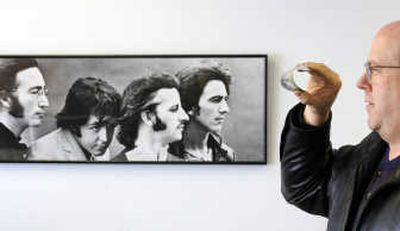Get your GibbyThin

Finding promotional compact discs in the mail or on newsstands isn’t novel – they’ve long been used to push Internet providers and bundled with magazines.
A Spokane Valley media company, however, hopes its spin on a new type of flexible, thinner DVD will grab the attention of newspaper and magazine publishers and direct-mail advertisers.
Gibby Media Group Inc. touts the GibbyThin, its version of discs developed in Europe, as a way for publishers to capture newsstand sales and businesses to enhance products by adding multimedia and interactivity.
The company claims the discs, about half as thick as standard DVDs but still capable of holding 4.7 gigabytes of data, are supple enough to run through mail-sorting machines and can be attached to magazine covers or inserted into newspapers.
While the discs cost about 25 percent more up front, they make up for it in reduced shipping and packaging costs, said CEO and president Lon Gibby. He also promotes them as eco-friendly, saying the discs require less plastic and lack harmful bonder resins.”If you could have a GibbyThin over an existing DVD, what’s the point of having a DVD that could get broken if you have all of the same features on it?” he said.
Typical DVDs are 1.2 millimeters thick, consisting of several layers of metal and plastic sandwiched together. GibbyThins measure 0.6 to 0.8 millimeters and weigh about 8 grams, and they lack toxic bonding agents, Gibby said.
The discs could hold audio, video and images, and the company even sees them replacing catalogs.
Gibby Media also is in talks with the U.S. Postal Service to send postcard-mounted discs at the postcard rate, a cheaper method than current options, Gibby said.
Gibby Media is the North American distributor for The ODS Group, a German company that developed the EcoDisc, said Michael Galley, a Portland-based Gibby Media executive vice president. An undisclosed financial group is financing the molds needed to create the discs, and another disc-replication company will license them and make the discs in North Carolina, he said.
Gibby projects selling about 150 million discs in the next eight months. He is banking on being among the first to market the technology in the U.S., and capitalizing on proprietary technology that lets discs run on different drives.
The company already made 10,000 thin discs featuring putting tips on video for Denver-based Yes! Golf to distribute at a recent trade show.
“They were able to give people something of value without them having to walk out of there with a big giant bag,” Gibby said. “I noticed when I was there that everybody had brochures and books and all kinds of plastics. And all that can be put right on a disc.”
Galley separately arranged for British newspaper the Mail on Sunday to ship more than 10 million EcoDiscs, he said. Presently, the Detroit Free Press is testing inserting them, he said.
The discs can play in most top-loading DVD players, Gibby said, although they could warp and become irretrievable if used in Apple Macintosh suction drives.
Gibby touts the discs as recyclable, saying the company eventually would like to set up a recycling program.
Some private companies recycle standard discs, but processors often want large quantities, said David Beschen, president and founder of Issaquah, Wash.-headquartered disc recycler GreenDisk Inc.
While GreenDisk still handles nondelivered music club CDs and promotional discs, “They’ve dropped dramatically with AOL’s departure from that marketing effort,” Beschen said.